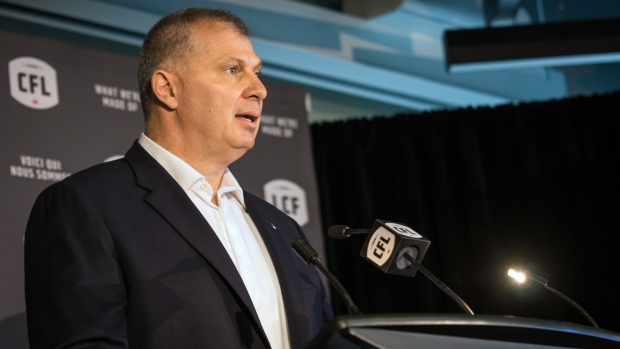Mar 12, 2019
Ambrosie to speak at government hearing on concussions
CFL commissioner Randy Ambrosie and former NFL player Chris Borland have confirmed they will speak before a Canadian parliamentary committee studying the issue of sports-related concussions, Rick Westhead writes.

CFL commissioner Randy Ambrosie and former NFL player Chris Borland have confirmed they will speak before a Canadian parliamentary committee studying the issue of sports-related concussions before the committee winds up in early May.
NHL commissioner Gary Bettman has been asked to participate in the hearings but has not yet confirmed whether he will, said Peter Fonseca, a Liberal Party member of parliament from Mississauga, Ont. and former Canadian Olympic team member who is chairing the hearings.
“We’ve heard from parents, and we’ve heard from young athletes who have played about how concussions have affected them,” Fonseca said in an interview on Friday.
“We want to be able to share with these commissioners, whether it’s Randy Ambrosie or commissioner Bettman, the power that they have as decision-makers and leaders and that it is in their interest, we would think, to grow the grassroots of their sports and have parents feel their kids are playing in safe environments all the way through.”
A CFL spokesman said Ambrosie was unavailable and an NHL spokesman did not respond to an email requesting comment.
Ambrosie, a former offensive lineman who played with Calgary, Toronto and Edmonton, has sought to improve player safety since his hiring as the league's commissioner in July 2017.
In September 2017, the CFL announced it would outlaw full-contact padded practices during the season, a move designed to cut down the number of collisions that players give and take during a season.
CFL teams have also received an extra bye week each season to help reduce the risks of player injury.
At the same time, Ambrosie has refused to acknowledge a link between repeated head trauma and long-term brain diseases. Bettman has taken the same stance publicly, although internal NHL emails have shown top NHL officials have acknowledged that head injuries led to a higher prevalence of depression and personal tragedies.
It’s unclear how Bettman would respond to the claim that the NHL should embrace a leadership role when it comes to safety in amateur hockey.
In one string of emails in 2014 that was unsealed in the NHL’s concussion lawsuit, Gary Meagher, the NHL’s vice-president for communications, wrote to a public relations firm executive that the league had a different approach toward safety from that of the NFL, which “is in the business of selling that they are making the game of football safer at all levels — it is smoke and mirrors but they are masters of smoke and mirrors.”
“The N.H.L. has never been in the business of trying to make the game safer at all levels and we have never tried to sell the fact that this is who we are,” Meagher wrote.
Borland retired in 2015 from the NFL after one season, citing worries about the long-term effects of head trauma. A linebacker with the San Francisco 49ers, Borland was 24 at the time he walked away from the game. Since his retirement, he has filmed a CTE public service announcement and done many news media interviews about the issue of brain injuries in sports.
Since the hearings began Nov. 21, witnesses have discussed the issue of concussions in both professional and amateur sports. Hockey has been a repeated discussion point.
Former Montreal Canadiens goalie Ken Dryden, the hearing’s first witness, reiterated a case he has made repeatedly that the NHL should introduce a no-tolerance rule for hits to the head. Former Flyers forward Eric Lindros delivered the same message, as did Mark Aubry, a doctor with the Ottawa Senators and Hockey Canada.
The NHL has made some, but not all, head hits against the rules. In March 2010, the league’s general managers approved Rule 48, which penalized lateral, blindside hits to an opponent where the head was targeted.
Fonseca said that when testimony wraps up, a group of government analysts will write a report that will be tabled in parliament. The report will include a series of recommendations for handling concussions moving forward.

